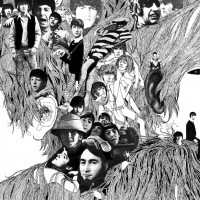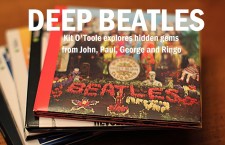As the most popular pop band of all time, it naturally follows that the Beatles have been the most-covered band of all time. Their songs’ popularity has extended into every form of music, and that greasy, soulful organ jazz has been no exception. Before the Beatles were even history, Lonnie Smith was covering “Eleanor Rigby” and Charles Earland rewrote that tune into his signature song “Black Talk.” The pervasive influence of the Fab Four hadn’t even escaped newer organ groups too young to remember when the Beatles were together, and one of today’s premier soul-jazz combos are one of those blissfully afflicted with Beatle-itis.
The members of Soulive have been Beatles fans from the word “go,” and after more than a decade together, they decided it was time to pay homage and put their covers on wax. Guitarist Eric Krasno explains, “We thought about doing all of Rubber Soul, but that band has so many great tunes. We picked the ones that lent themselves well to our sound, and others where we could add the Soulive flavor.”
The resulting disc, Rubber Soulive, out September 14, comes after Soulive over the last several years have taken their undiluted organ/guitar/drums base sound and supplemented it with excursions into hip-hop, vocals, horns and other change-ups. One of our earliest reviews shone a light on their 2005 offering Break Out that found them branching out into some of these diversions a bit, but the live-in-the-studio recorded Rubber Soulive brings the trio full circle back to their roosty beginnings.
The straight-ahead angle the Krasno, organist Neal Evans and his brother Alan Evans undertook for this project means they weren’t going to do any substantial reworking of the melody of “Eleanor Rigby” or any other Beatles songs, and no one will have any trouble at all identifying these songs. The question is how much of the Soulive identity remains intact and do these songs groove in the Soulive Way. There’s no question that they do.
Songs like “Revolution” and, yes, “Eleanor Rigby” keep the same body but each are retrofitted with a funky chassis. On other song like “Drive My Car,” “Taxman” and “I Want You (She’s So Heavy)”, Neal Evans’ footwork on the organ’s bass pedals put these renditions beyond just your ordinary covers; he’s got McCartney’s signature melodically imposing style pat, but makes his pulses more in tune with the shuffling, filthy rhythms his brother Alan is putting down. The two combine for drum/bass amalgamation on “Come Together” that rivals the original.
Krasnos, meanwhile, stays close in spirit to the vintage versions of these songs yet for the most part plays in a jazz vein in the style of George Benson and Melvin Sparks: dig how he plays octaves on the chorus for “Help!”. Krasnos can still rock out convincingly when duty calls, though, as he did for “I Want You” (video of live performance below). He and Neal Evans trade off following the lyric lines depending on the selection, and made some good decisions on overall arrangements.
Playing a bunch of songs everyone’s heard a billion times without disguising the melodies might sound like a good reason to be critical of Soulive’s latest record. After a while, though, I’ve come to look at Rubber Soulive from a different perspective: in bringing back some of the great tunes of the Beatles, Soulive brought themselves back to their no-frills, greasy early days when they were busting their collective tails to make a name for themselves. That’s the real attractiveness of Rubber Soulive, to hear a band that’s “made it” still performing like they are playing for next week’s groceries. If their mutual admiration for the music John, Paul, George and Ringo was needed to inspire this back-to-basics set, well, that’s all the more better.
Rubber Soulive will be offered by Soulive’s own label, Royal Family Records.
- Tobias Meinhart – ‘Sonic River’ (2025) - April 22, 2025
- Ivo Perelman, with William Parker + Rashied Ali – ‘Sad Life’ (1996, 2025 reissue) - April 15, 2025
- Nels Cline – ‘Consentrik Quartet’ (2025) - March 31, 2025






Pingback: Delvon Lamarr Organ Trio - 'I Told You So' (2021) | Something Else!
Pingback: Delvon Lamarr Organ Trio - 'I Told You So' (2021) - 192kb